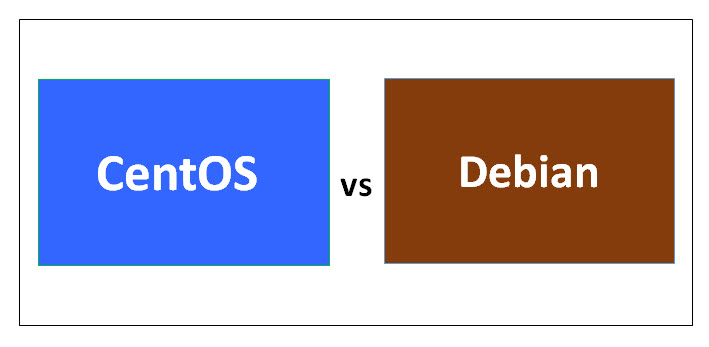Updated May 11, 2023
Difference Between CentOS vs Debian
CentOS vs Debian are two flavors of Linux operating systems. CentOS, as said above, is a Linux distribution. It is free and open-source. It is enterprise-class – industries can use meaning for server building; a large community supports it and is functionally supported by its upstream source, Red Hat Enterprise Linux. A group of individuals under the Debian project builds and supports Debian, a Unix-like computer operating system comprising open-source components.
Debian uses Linux as its Kernel. Fedora, CentOS, and Oracle Linux are different distributions from Red Hat Linux and variants of RedHat Linux. Ubuntu, Kali, etc., are variants of Debian. People use CentOS and Debian as internet or web servers for web hosting, email servers, and FTP servers.
Head To Head Comparison Between CentOS vs Debian (Infographics)
Below are the top 12 differences between CentOS vs Debian:
Key Differences Between CentOS vs Debian
Both servers are popular choices in the market; let us discuss some of the major differences:
- One should pick Debian as it generally has more up-to-date packages and because upgrading to a newer version is more accessible. Many people have started their GNU/Linux journey with Red Hat Linux and have always used CentOS and Fedora on their desktops.
- If one is more used to CentOS and is more accustomed to working with it or has been using it for a long, then there is no real reason to migrate to Debian. CentOS vs Debian are the best options for choosing a GNU/Linux distribution to install on their web server or any other server.
- There is one more thing that one should keep in mind when installing a Web Server. It is recommended to select CentOS as it is officially supported for installing reseller tools like cPanel.
CentOS vs Debian Comparison Table
The primary comparison is discussed below:
| CentOS | Debian |
| CentOS is more stable and supported by a large community | Debian has relatively less market preference. |
| Mission-critical servers are hosted on CentOS. | Ubuntu is fast catching up. A lot of people are betting on it. |
| CentOS does not support many different architectures. | Debian has more packages. |
| Both support desktop applications, but CentOS has a slight edge over Debian. | Debian-based distributors for more used for serves. |
| CentOS versions are maintained for ten years, meaning enterprise applications have great support. | Working with Debian requires good Linux knowledge, especially for installing and customizing new software. |
| CentOS new versions are usually released after a long gap, making these systems very stable. However, a minor release does happen now and then. | New versions of Debian are usually released with a two years gap, so there is enough time to test and fix bugs. Hence these systems are more stable. |
| After a major release, the CentOS code is frozen and never changed except for security flaws or bugs. This causes issues while working with it as the next update usually happens after 5 years, and many application software changes in this duration. For example, CentOS 5 supports MySQL 5.1 only, whereas newer versions of MySQL are available, which CentOS does not help. | Due to rapid development and a short testing cycle, most significant vendors prefer CentOS over Debian. The stability and comprehensive testing of CentOS make it the preferred choice for teams such as Oracle and MySQL. Most developers who build application software on Linux use Ubuntu as the desktop and still use CentOS as a server. |
| Usually, it isn’t easy to upgrade a version of CentOS locally. Official sources recommend installing a newer version and upgrading to an older one. | Upgrading Debian from one stable version to another is easy and not painful. |
| It does not have an easy GUI. | It has desktop-friendly applications and GUI. |
| CentOS is released so late that sometimes it lags behind the Red Hat release. | Most people believe Debian systems are less stable or trouble-free than RHEL/CentOS. |
| The core software of CentOS, such as the RHEL/CentOS components, the Kernel, and all its utilities, come from the distribution. In contrast, add-on software like Apache, PHP, Java, and MySQL come from newer sources such as Fedora or vendors directly such as MySQL. | A fundamental reason to use Debian is if they provide unique functionality necessary for a system; in such cases switching to Debian makes sense. Apt repositories in package managers have the latest source code for open-source languages and frameworks like ruby, rails, PostgreSQL, Golang, selenium, angular2-dart, etc. Ubuntu is very suitable to work with when using Docker file/s docker containers. |
| Crashers are so rare in CentOS. | The same goes here. |
Conclusion
This article covers almost all business-specific or choice-based reasons to differentiate between CentOS and Debian. Both are excellent software used by thousands of applications and many more developers. The industry trusts Debian vs CentOS and runs the core components of mission-critical applications. Hence it does not matter much which one is used in a given scenario. A developer can prefer which he is more comfortable with and about which he knows the most.
If a general guideline is to be provided, CentOS probably runs several servers currently than any other version of Linux. For a beginner also, Learning and starting with CentOS makes more sense, and it provides better and more challenging career scope. Ubuntu is a significant brownie point for Debian. From an administrator perspective, CentOS also wins in most situations compared to Debian.
Recommended Articles
This has been a guide to the top differences between CentOS vs Debian. Here we discuss CentOS vs Debian key differences, infographics, and comparison table. You may also have a look at the following articles to learn more –




